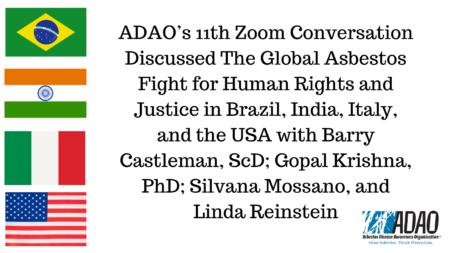Meeting mondiale sull’amianto: l’esempio di Casale «in rete» con Usa, Canada, Brasile e India by Silvana Mossano
Posted on July 30, 2021
 On Wednesday, July 21, 2021, the Asbestos Disease Awareness Organization (ADAO) hosted our 11th Zoom conversation, entitled “The Global Asbestos Fight for Human Rights and Justice.” We are grateful to all our panelists, including Barry Castleman, ScD; Gopal Krishna, PhD; and Silvana Mossano. Regretfully Ashok Ghosh PhD and Fernanda Giannasi were unable to join the conversation, but we did our best to highlight their work and problems in their countries.
On Wednesday, July 21, 2021, the Asbestos Disease Awareness Organization (ADAO) hosted our 11th Zoom conversation, entitled “The Global Asbestos Fight for Human Rights and Justice.” We are grateful to all our panelists, including Barry Castleman, ScD; Gopal Krishna, PhD; and Silvana Mossano. Regretfully Ashok Ghosh PhD and Fernanda Giannasi were unable to join the conversation, but we did our best to highlight their work and problems in their countries.
For those who could not join us at the event, the full video is below. The event was an international success, featuring panelists and attendees from India, Italy, the United States, and more.
The conversation focused on the extreme human rights violations caused by the manmade disaster of asbestos. As Barry Castleman noted, the hazards of asbestos have been known for decades. The “background of the asbestos industry is that it was largely built on the failure to warn people about the lethality of asbestos,” Barry said. “Clearly a human rights matter that you have companies using every dirty trick in the book to sell asbestos.”
Gopal Krishna discussed the Ban Asbestos Network of India (BANI), which was formally started in 2002 by villagers and people’s movements to help stop seven proposed asbestos based plants in Bihar, India, Krishna has worked on behalf of BANI to educate villagers, students, and political parties about the ongoing global struggle for a world free from asbestos-caused diseases, and is working towards justice for all those who have been affected.
We also heard from Silvana Mossano, an Italian journalist and community advocate. She detailed the Eternit One maxi-trial, which involved over 300 defendants who were affected by the Eternit plants, in Casale Monferrato, Italy run by the Swiss Schmidheiny family. The Schmidheiny family were well aware that asbestos was carcinogenic, but continued to use it, and did not prevent the fiber from spreading inside the factory and freely outside the plant. Therefore, even though many of the victims in the town never stepped foot in the planthey were still exposed through their environment.
We will not be free from asbestos until the whole world is free from the deadly toxin. America must join the nearly 70 other countries that have banned asbestos. If we as a country ban asbestos, other nations will follow. We can be a leader in prevention and policy – all we need to do is take the first step. We call upon Congress to pass the Alan Reinstein Ban Asbestos Now Act (ARBAN) of 2021, which would ban all imports and use, force the Environmental Protection Agency (EPA) to do a legacy study of the asbestos found in millions of home, schools, and workplaces, and would provide all Americans with the right to know where asbestos is imported and used. See the full video below for each of our panelists’s messages to Congress.
If you enjoyed this conversation and want more like them, please join us for our 16th Annual International Asbestos Awareness & Prevention Conference (AAPC) on September 17. ADAO will also host its first ‘Art, Advocacy, and Shared Stories’ film festival during the conference.
Linda Reinstein
